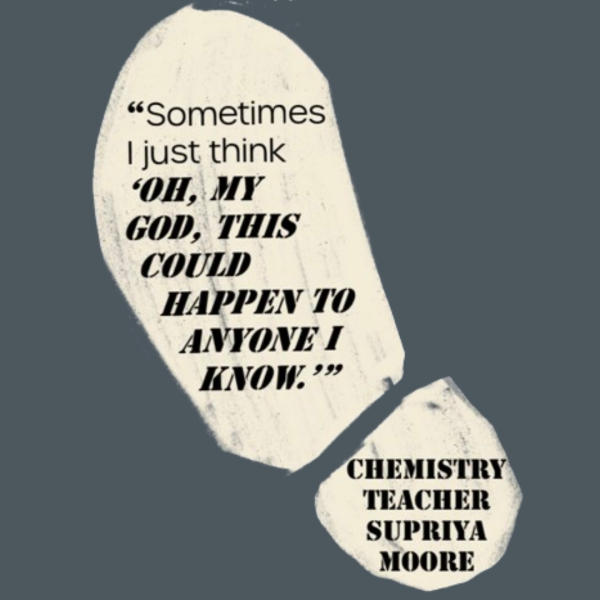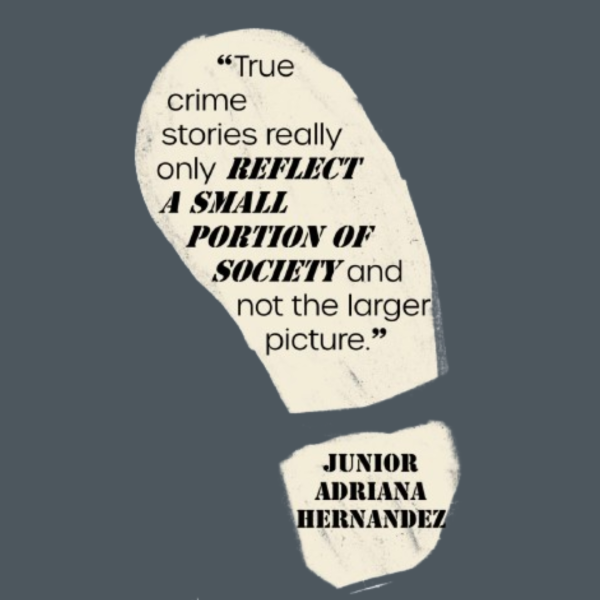Trigger warning: This story mentions murder, abuse and cannibalism.
A 16-year-old girl’s body was found in Washington’s Green River on July 15, 1982. Reports found the young girl was strangled to death and left in the river with only her green and white blouse and blue jeans wrapped around her neck. In the month following, four more bodies were discovered, marking the beginning of the longest murder investigation in the United States: the investigation of the Green River Killer.
This tragic case garnered much media attention, with the production of several movies and films, including the 2008 film “The Capture of the Green River Killer” and the documentary series “Green River Killer: Mind of a Monster.” This was the first case that Chemistry teacher and avid true crime consumer Supriya Moore heard about. Moore says that the documentation of serial killers is distinct to the U.S. and that before watching such cases, she was unaware of the horrifying things that occur in the world.

“Initially, I was in disbelief that such gruesome things could happen,” Moore said. “Seeing the truth, I was shocked that such people could just kill others. Most of these serial killers are male, and the victims are mainly young females. Sometimes I just think ‘Oh, my God, this could happen to anyone I know,’ or ‘This could happen to me.’ So there’s that personal connection in the genre.”
According to a survey of 1,000 Americans, 64% of respondents found true crime cases to be thrilling and suspenseful. While Moore finds the graphic and horrific nature of true crime content unsettling, she admits that it’s the excitement of the case that draws her in. She is among the 62% of Americans who believe that watching the genre has made them more aware of their surroundings and better equipped to spot potential dangers.
“Unlike watching fiction, this stuff happened to people — people like me,” Moore said. “You are always on your own, sometimes you’re traveling by yourself. You’re going on planes or taking cabs or Ubers and you’re there by yourself. So how do you protect yourself? You have to be more cautious instead of just saying nothing will happen and being unprepared.”
Unlike Moore, curriculum lead and school-based therapist Leila Lurie has avoided the true crime genre for the past five years. Although Lurie is not an expert on true crime, she has found that focusing on more positive media has a greater impact on her outlook. She believes that over the years the world has become increasingly polarized because of its anger and disharmony. As a result, she has avoided content that could potentially add to the negativity.
“I have decided that I don’t need to add any more negativity to my life voluntarily,” Lurie said. “I think that crime shows can desensitize us to real suffering, which adds a sort of negativity and darkness to our psyche. Along with that, I would imagine there’s a sense of re-victimization of the victim’s life or the sister of the victim’s life or whoever was taken from the family as they are just displaying the family’s loss all over again.”
True crime shows and films do not require the consent of the victims or their families to create the media, often leading to the exploitation of the case. In 2022, Netflix released the biographical drama “Monster: The Jeffrey Dahmer Story,” following the case of cannibal Jeffery Dahmer. Netflix faced backlash for reviving the story without the consent of the victims’ families, compounded by the internet’s unsettling romanticization of actor Evan Peters’s portrayal of the criminal and a wave of jokes downplaying Dahmer’s crimes. Moore agrees with Lurie’s opinion, expressing concern over the lack of consent from the victims’ families and the potential harm true crime shows can cause.
“I wish the true crime shows got consent from all the families,” Moore said. “They should show them ahead of time what’s going to be released. I really feel for them because they have to live through that whole trauma again by watching the shows. I hope they start doing that for all these shows in the future.”
Junior Adriana Hernandez, who identifies as a true crime enthusiast, highlights another concern in the genre — the suppression of marginalized stories. When the case of Gabby Petito’s disappearance and murder unfolded in 2021, it gained a great deal of attention on the news and social media. The media coverage led to criticism that Petito’s case received far more attention than the hundreds of other missing people in the country simply because she was young and white — a phenomenon dubbed “missing white woman syndrome.” Hernandez believes this trend overlooks many important stories of marginalized communities.
“There is a big issue in the true crime community in the sense that often it’s used to amplify the stories of white women or cis people, while the stories of people of color and people who are more isolated from society are not heard as often,” Hernandez said. “Since people that are more marginalized in society aren’t as openly spoken about in the true crime community, true crime stories really only reflect a small portion of society and not the larger picture.”

Despite its controversies, true crime content remains incredibly popular, with more than half of Americans consuming the genre. Lurie believes that true crime fans watch the genre for its classic conflict-and-resolution storyline, along with the satisfaction of seeing justice served to wrongdoers.
“In true crime shows, you’re often learning what to do in a situation, what not to do, what mistakes were made, and I think that there might be something that draws us to that,” Lurie said. “It’s a nasty subject —– I think there’s some kind of weird voyeurism or a forbidden fruit thing. You get to dip into some depraved world.”
Lurie says that true crime content has a long way before it becomes beneficial to its viewers and society as a whole. She believes that books, which tend to be less exaggerated, are a better medium for true crime stories as they avoid the overdramatization often seen in films. By addressing cases like the Green River Killer with a focus on ethical storytelling, Lurie believes that audiences can indulge in curiosity without crossing the line of exploitative sensationalism.
“I wish that true crime was in books rather than TV,” Lurie said. “In shows and movies, we are bombarded with so much of the explicit content that we become desensitized to it. Folks who want to make money on TV shows have to ratchet it up more and more and make it more explicit, more sensationalized and more dramatic. That’s just not good for us.”
While acknowledging the controversies plaguing true crime, Hernandez nevertheless believes that watching true crime benefits viewers as it educates them on the common tactics used by criminals and teaches them how to avoid dangerous situations.
“The good thing about true crime is that it shares people’s stories,” Hernandez said. “That informs people of the realities of our world and dangers that maybe they don’t talk about in their own communities, and then it gives them a space to learn about that. While a lot of people think that true crime makes you worry too much, or adds on a layer of stress in your life, I think it’s overall just made me more aware of how to be safe.”












